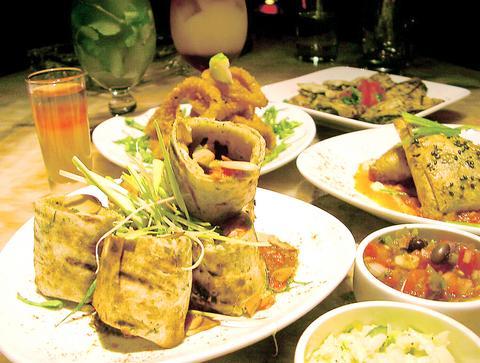If you're not a fan of Latin music or a good salsa dancer, there are still plenty of reasons to visit Barrio, the new Latin bar in Taipei: the food for example. At Barrio there are no microwave pizzas or cold snacks, and no burritos or enchiladas, the flour for which comes from Taipei's Florida bakery.
Barrio's kitchen offers a third choice, what chef Tomer Feldman calls "fusion Latino food." On the menu you see interesting combinations such as Latino sushi or Italian-styled quesadillas.
"I wanted people to see the unexpected when they come here, and to have some new impressions about Latin food," said Israeli-born Feldman. Having been a chef at up-scale New York restaurants for 12 years, such as Italian restaurant Puccini in upper West and Bari Cafe in Soho, Feldman said he's experienced with Latin food. Creating variations and fusion seems to interest him most. In Taiwan, his previous job was a chef at Rendezvous, the first fusion Italian restaurant in Taipei.

PHOTO: YU SEN-LUN, TAIPEI TIMES
Latino sushi is actually tortilla rolls, like burritos, but chopped in slices which resemble sushi. Goat cheese and roasted pepper roll is the best-selling item so far among the Latino sushi dishes. Traditionally, Mexican burritos comprise wrapped rice and beans, thus giving a heavy feel after a meal. In Feldman's recipes the fillings are much lighter and healthier, good for dancing, perhaps?
One more reason to eat at Barrio is you get to taste different kinds of dipping sauces with just one tapas dish. According to Feldman having different dipping sauces in one dish is common to Israeli restaurants. These home-made sauces have, again, each been infused with unusual ingredients. Salsa sauces are added to beans and toasted with ground cumin seeds. Coleslaw is added to jalapenos for a spicy coleslaw, or "fusion kimchi."
In March, Barrio's kitchen will present main course dishes such as burritos, enchiladas and tacos. "But again, they will be unconventional Latin main courses," Feldman said.

The primaries for this year’s nine-in-one local elections in November began early in this election cycle, starting last autumn. The local press has been full of tales of intrigue, betrayal, infighting and drama going back to the summer of 2024. This is not widely covered in the English-language press, and the nine-in-one elections are not well understood. The nine-in-one elections refer to the nine levels of local governments that go to the ballot, from the neighborhood and village borough chief level on up to the city mayor and county commissioner level. The main focus is on the 22 special municipality

The People’s Republic of China (PRC) invaded Vietnam in 1979, following a year of increasingly tense relations between the two states. Beijing viewed Vietnam’s close relations with Soviet Russia as a threat. One of the pretexts it used was the alleged mistreatment of the ethnic Chinese in Vietnam. Tension between the ethnic Chinese and governments in Vietnam had been ongoing for decades. The French used to play off the Vietnamese against the Chinese as a divide-and-rule strategy. The Saigon government in 1956 compelled all Vietnam-born Chinese to adopt Vietnamese citizenship. It also banned them from 11 trades they had previously

Jan. 12 to Jan. 18 At the start of an Indigenous heritage tour of Beitou District (北投) in Taipei, I was handed a sheet of paper titled Ritual Song for the Various Peoples of Tamsui (淡水各社祭祀歌). The lyrics were in Chinese with no literal meaning, accompanied by romanized pronunciation that sounded closer to Hoklo (commonly known as Taiwanese) than any Indigenous language. The translation explained that the song offered food and drink to one’s ancestors and wished for a bountiful harvest and deer hunting season. The program moved through sites related to the Ketagalan, a collective term for the

As devices from toys to cars get smarter, gadget makers are grappling with a shortage of memory needed for them to work. Dwindling supplies and soaring costs of Dynamic Random Access Memory (DRAM) that provides space for computers, smartphones and game consoles to run applications or multitask was a hot topic behind the scenes at the annual gadget extravaganza in Las Vegas. Once cheap and plentiful, DRAM — along with memory chips to simply store data — are in short supply because of the demand spikes from AI in everything from data centers to wearable devices. Samsung Electronics last week put out word